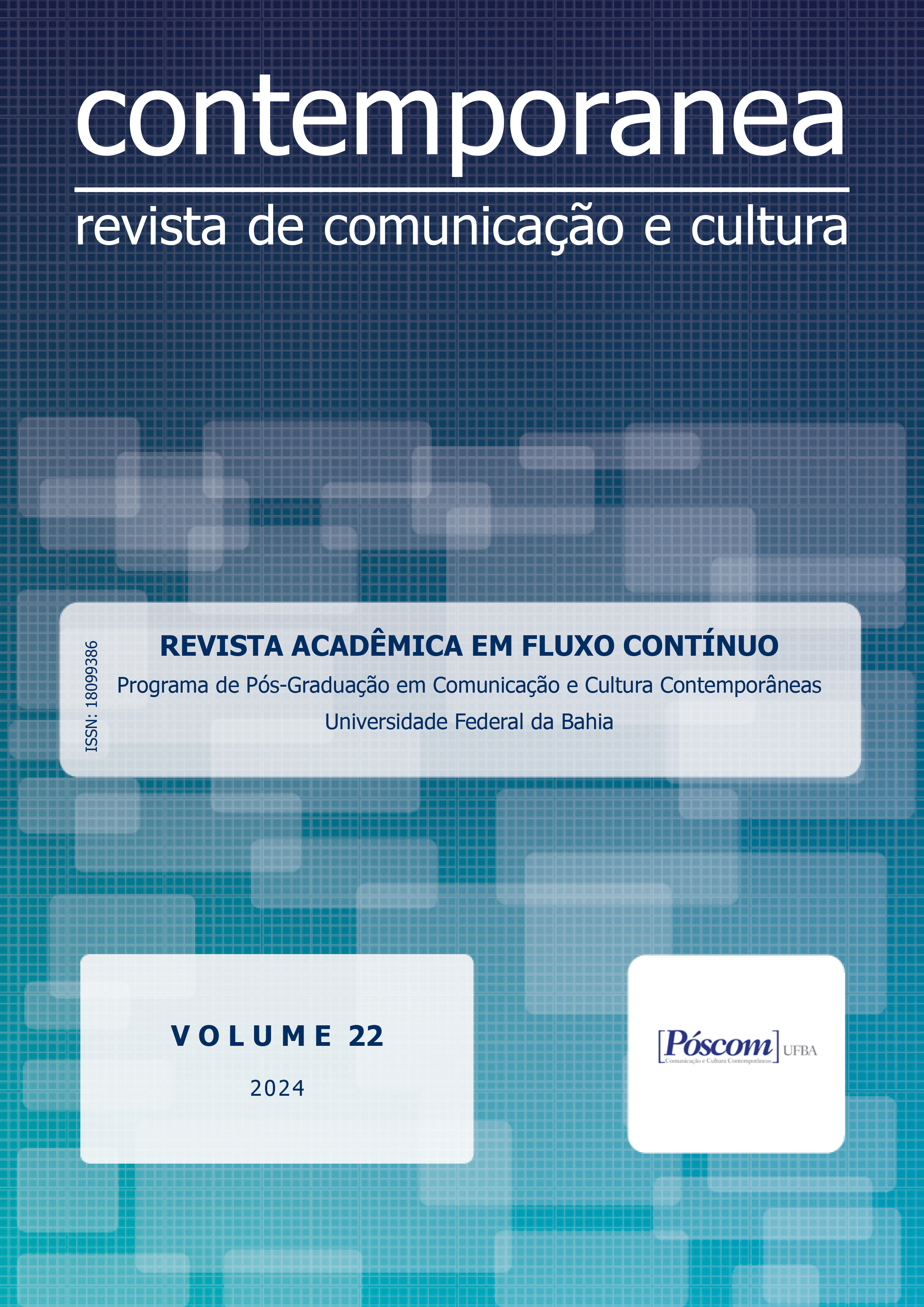AGEISM AND THE PROMOTION OF AGELESSNESS IN CONTEMPORARY ADVERTISING
DOI:
https://doi.org/10.9771/contemporanea.v22i1.57451Keywords:
Communication and Consumption, Advertising, AgeismAbstract
The article aims to reflect on certain communication processes and their relationship with current ways of being and modes of sociability. To this end, it highlights the privileged position occupied by advertising communication in ongoing disputes around the production of meanings for aging and longevity. We present the sociocultural foundations of the discussion on how certain negative prejudices about old age still largely inform the media production. We focus on the analysis of empirical data for a critical reflection on the subject. We highlight the promotion of agelessness, ideology which advocates that individuals take responsibility for how they “choose” to age. We argue in favor of the social relevance of academic research and its active engagement in the struggle against ageism, in favor of the constitution of renovated communicational processes conducive to a respectful coexistence among generations.
Downloads
References
BARROS, A. População estimada do país chega a 213,3 milhões de habitantes em 2021. Agência IBGE Notícias, [Rio de Janeiro], 27 ago. 2021. Disponível em: https://agenciadenoticias.ibge.gov.br/agencia-noticias/2012-agencia-de-noticias/noticias/31458-populacao-estimada-do-pais-chega-a-213-3-milhoes-de-habitantes-em-2021. Acesso em: 20 out. 2023.
CALASANTI, T. Combating Ageism: How successful is successful aging? The Gerontologist, Oxford, v. 56, n. 6, p. 1093-1101, 2016.
CALASANTI, T.; SLEVIN, K. Age matters: Re-aligning feminist thinking. New York: Routledge, 2006.
CAMARANO, A. A. Ministério da Economia. Nota Técnica. Os dependentes da renda dos idosos e o coronavírus: órfãos ou novos pobres? Rio de Janeiro: IPEA, 2020. (n. 81).
CANNES Lions: Brasil é o 3º mais criativo do mundo: Cannes Lions divulga o Lions Creativity Report 2021 com insights dos dois últimos anos. Promoview, São Paulo, 20 set. 2021. Disponível em: https://www.promoview.com.br/categoria/publicidade/cannes-lions-brasil-e-o-3-mais-criativo-do-mundo.html. Acesso em: 20 out. 2023.
CASTRO, G. G. S. Os velhos na propaganda: atualizando o debate. São Paulo: Pimenta Cultural, 2018.
CÔRTE, B. Na era da leveza, ‘o tempo é liberdade e a idade é constrangimento’. In: CASTRO, G. G. S.; HOFF, T. (org.). Comunicação, consumo e envelhecimento no contemporâneo: perspectivas multidisciplinares. Porto Alegre: Sulina, 2018. p. 31-54.
DARDOT, P.; LAVAL, C. A nova razão do mundo: ensaio sobre a sociedade neoliberal. São Paulo: Boitempo, 2016. (Estado de sítio).
DAVIS, A. Promotional cultures: the rise and spread of advertising, public relations, marketing and branding. Cambridge: Polity, 2013.
DEBERT, G. G. A reprivatização do envelhecimento nas imagens da mídia. In: CASTRO, G. G. S.; HOFF, T. (org.). Comunicação, consumo e envelhecimento no contemporâneo: perspectivas multidisciplinares. Porto Alegre: Sulina, 2018. p. 75-93. (Comunicação e consumo).
DEBERT, G. G. Os velhos na propaganda. Cadernos Pagu, Campinas, v. 21, p. 133-155, 2003.
GULLETTE, M. M. Ending ageism: or how not to shoot old people. New Brunswick: Rutgers University Press, 2017.
HA, L.; HODGSON, A. Ageing Matters: The Future of Older Populations. [S. l.]: Euromonitor International, 2020.
SUPPLEMENTAL nutrition drinks: help or hype? Harvard Health Publishing, Cambridge, 31 ago. 2020.
KUSCHICK, C. L. B. R.; MACHADO, F. V. K. Compre, leia, siga e rejuvenesça! Sobre os sentidos movimentados e construídos por Veja acerca da velhice ao longo de sua história (1968-2014). Galáxia, São Paulo, n. 32, p. 138-150, ago. 2016.
MERLIN, N. Colonización de la subjetividad: los medios masivos de comunicación en la época del biomercado. Buenos Aires: Letra Viva, 2017.
RAISBOROUGH, J. Age as trouble: towards alternative narratives of women’s ageing. Psychology of Women and Equalities Section Review, [s. l.], v. 2, n. 1, p. 1-16, 2019.
ROCHA, E. Culpa e prazer: imagens do consumo na cultura de massas. Comunicação, Mídia e Consumo, São Paulo, v. 2, n. 3, p. 123-138, 2005.
OFFICER, A. et al. Valuing older people: time for a global campaign to combat ageism. Bull World Health Organ, [s. l.], v. 94, p. 710, 2016.
SESC; FUNDAÇÃO PERSEU ABRAMO. Pesquisa de Opinião Pública. Idosos no Brasil II: vivências, desafios e expectativas na 3ª idade. Sumário Executivo. Pesquisas FPA, [São Paulo], 2020.
SILVEIRA, S. A. Exclusão digital: a miséria da informação. São Paulo: Ed. Fundação Perseu Abramo, 2003.
WOODWARD, K. Performing Age, Performing Gender. NWSA Journal, [s. l.], v. 18, n. 1, p. 162-189, 2006.
YLÄNNE, V. Representações dos velhos e da velhice na propaganda do século XXI. In: CASTRO, G. G. S.; HOFF, T. (org.). Comunicação, consumo e envelhecimento no contemporâneo: perspectivas multidisciplinares. Porto Alegre: Sulina, 2018. p. 95-114.
YLÄNNE, V. ‘Conclusion’. In: YLÄNNE, V. (ed.). Representing Ageing: Images and Identities. London: Palgrave Macmillan, 2012. p. 226-231.
Downloads
Published
Issue
Section
License
Copyright (c) 2024 Gisela Grangeiro da Silva Castro

This work is licensed under a Creative Commons Attribution-ShareAlike 4.0 International License.
Os autores que publicam nessa revista devem concordar com os seguintes termos relativos aos Direitos Autorais:
Autores mantém os direitos autorais e concedem à revista Contemporanea e à Faculdade de Comunicação da Universidade Federal da Bahia o direito de primeira publicação, com o trabalho simultaneamente licenciado sob a Licença Creative Commons Attribution que permite o compartilhamento do trabalho com reconhecimento da autoria e publicação inicial nesta revista.
Autores têm autorização para assumir contratos adicionais separadamente, para distribuição não-exclusiva da versão do trabalho publicada nesta revista (ex.: publicar em repositório institucional ou como capítulo de livro), com reconhecimento de autoria e publicação inicial nesta revista.
Autores têm permissão e são estimulados a publicar e distribuir seu trabalho online (ex.: em repositórios institucionais ou na sua página pessoal) a qualquer ponto antes ou durante o processo editorial, já que isso pode gerar alterações produtivas, bem como aumentar o impacto e a citação do trabalho publicado.


